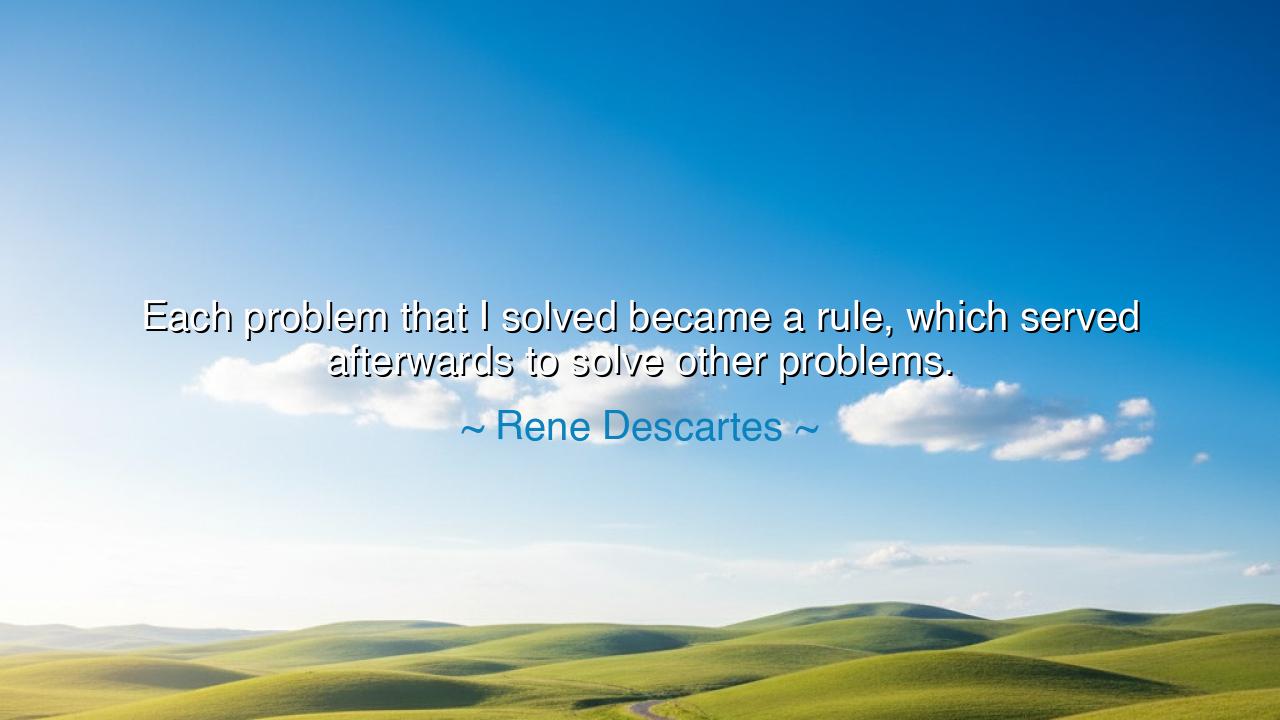
Each problem that I solved became a rule, which served afterwards
Each problem that I solved became a rule, which served afterwards to solve other problems.






"Each problem that I solved became a rule, which served afterwards to solve other problems." These words, spoken by the great René Descartes, capture the essence of problem-solving and the cumulative nature of knowledge. Descartes, the father of modern philosophy and mathematics, understood something fundamental about the nature of human understanding—that each solution not only resolves a single problem, but lays the groundwork for further discoveries, creating a chain of knowledge that builds upon itself. His insight reflects a timeless truth: every challenge faced and overcome leads to a deeper understanding, and that understanding serves as a tool to tackle new and greater obstacles. It is a perpetual cycle, one in which each answer is not an endpoint but a stepping stone to future growth.
In the ancient world, the pursuit of knowledge was often seen as a journey rather than a destination. The Greeks, particularly the philosophers like Socrates and Plato, believed that wisdom came not from knowing all the answers, but from the persistence of questioning, exploring, and refining one’s understanding of the world. The process of learning was seen as cumulative, with each new insight deepening one's connection to the truth. Aristotle, too, recognized that knowledge builds upon itself, a concept he articulated through his work on syllogism and deductive reasoning. He understood that, in the quest for understanding, each truth discovered leads to more refined questions and, in turn, to greater wisdom. Descartes' perspective aligns with this ancient tradition, recognizing that problem-solving is a continual process, and each solution offers the tools for solving future challenges.
Consider the life of Isaac Newton, who epitomized Descartes’ idea. Newton’s work in calculus, optics, and gravity was not merely the resolution of isolated problems; it was the building of rules that enabled him to solve even greater challenges. His law of universal gravitation, for example, came not just from one insight but from a progression of mathematical and philosophical developments over years. The problems he solved in physics helped him develop methods that could be applied to countless other issues, from celestial motions to the falling of an apple. Each breakthrough provided a foundation for the next, until Newton had created a vast structure of knowledge that transformed the way humanity understood the natural world. His ability to see each solution as a rule that could unlock future discoveries is a testament to the enduring truth in Descartes' words.
Descartes himself, in his pursuit of clarity and certainty, applied his own rule of methodical doubt, a process by which he questioned everything until he arrived at the indubitable truth of his own existence, encapsulated in the famous phrase, "Cogito, ergo sum"—I think, therefore I am. This breakthrough in philosophy became the rule by which he approached all problems of knowledge. Every solution he arrived at, whether in geometry, philosophy, or mathematics, built upon this foundational certainty. It was not just an isolated answer but a rule that guided him to new insights in other fields. In his Discourse on the Method, Descartes laid down the framework for how to approach problem-solving, advocating for a systematic process where each solution served as the foundation for deeper exploration and understanding.
The legacy of Descartes’ philosophy and methodology has echoed through the centuries, influencing countless disciplines. The concept that each problem solved leads to a rule that can solve further problems is evident in the way science has progressed. Einstein, for instance, built his theory of relativity upon the ideas of Newton, who himself had developed his theories upon earlier work in astronomy and physics. Each new theory or discovery is not a standalone achievement but a building block, often influenced by the work of predecessors. The cumulative nature of scientific knowledge reflects Descartes' insight that each solution creates new rules, rules that offer the framework for solving future challenges.
The lesson from Descartes is one of perseverance and methodical progress. Every challenge we face in life, whether it be personal, intellectual, or professional, offers us an opportunity to create a rule, a principle, or a lesson that will guide us in the future. Just as Descartes and Newton relied on the principles they developed to navigate new and greater obstacles, we, too, must approach each difficulty as part of a larger journey. In doing so, we not only solve the immediate problem but also prepare ourselves for the challenges ahead, knowing that the answers we find today will serve as the foundation for our growth tomorrow.
In your own life, consider the challenges you face as opportunities for growth. Do not merely look for the solution to the immediate problem but seek to understand how the lessons learned from that experience can guide you in the future. Each solution you uncover can serve as a rule—a guiding principle that allows you to face the next challenge with greater confidence, clarity, and wisdom. Like Descartes, trust in the methodical progression of knowledge, knowing that each step forward is part of a larger journey that leads not only to solutions but to deeper understanding of the world and your place in it. Approach your problems not just as obstacles to overcome, but as stepping stones on the path to greater wisdom and personal evolution.






AAdministratorAdministrator
Welcome, honored guests. Please leave a comment, we will respond soon